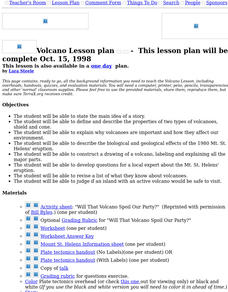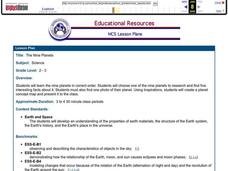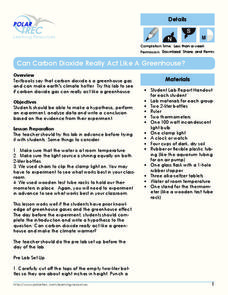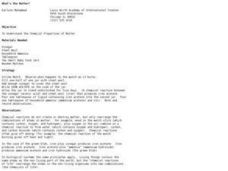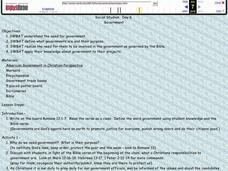Curated OER
Reduce, Reuse, Recycle and Respect
Second graders study the vocabulary that is associated with recycling and tell what recycling is. In this recycling lesson, 2nd graders use flash cards and Concentration type games to learn the vocabulary associated with recycling. They...
Curated OER
Thinking Like a Scientist
Students explore the scientific method. Students identify the steps in the scientific method and explain what each step means. Students use these steps to determine if boys or girls are taller in their classroom.
Curated OER
Let's Make a Plan
Students investigate pollution reduction policies in place at their school. In this pollution reduction lesson, students interview people in their school to determine what pollution policies are in place. They create a plan to increase...
Curated OER
Volcano Lesson Plan
Students describe the properties of volcanoes, and explain why volcanoes are important to the environment.
Curated OER
Global Warming Statistics
Students research real-time and historic temperature data of U.S. and world locations, and analyze the data using mean, median, and mode averages. They graph the data and draw conclusions by analyzing the data. A spreadsheet is used to...
Curated OER
Alternative Energy and Energy Saving Game
For this alternative energy and energy saving game worksheet, students create a multimedia game to present facts and influence people's behaviors about alternative energy sources, with links to helpful web resources.
Curated OER
Hot, Hot, Hot, Cold
Learners dance the image of falling snow. They move, swing, fall, and rise to music working to depict snow falling, the sun, and high/low movements. This is a well-thought out lesson that aids them in seeing movement as a form of...
Curated OER
Post-Nuclear War Survival
Students use critical thinking and discussion to solve a problempresented in a hypothetical dilemma.
Curated OER
Water Cycle Stories
Students explore the water cycle and associated phase changes. They predict what happens to the mass of an ice cube in a Ziploc bag, discuss and act out phase changes and diagram the water cycle.
Curated OER
Engaging Young Scientists with Inquiry: Part Two
Evaluating data and learning to communicate the results is a big piece of the inquiry puzzle.
Curated OER
Planets in our Solar System
A wonderfully designed, and very thorough lesson plan on the planets in our solar system. Designed for third graders, this lesson has learners use technology and multimedia tools to research, explore, and create information about the...
Curated OER
The Nine Planets
A solid lesson on teaching the nine planets in our solar system is here for you. In it, young scientists learn the correct order of the planets, and they choose one of the planets to do a research report on. They must come up with five...
Laboratory for Atmospheric and Space Physics
Space Travel Guide
Looking to take a trip? Why not go to space? Here, scholars take on the role as travel agent to create a guide to their favorite planet including travel tips and sightseeing recommendations.
Weebly
Phases of Life Poster Project
Now this is a clever approach to familiarizing aspiring astronomers with the phases of the moon! They first record the specific dates for ten special events in their lives. Then they use an online moon phase calendar to find out which...
Curated OER
Gravity Versus The Mighty Egg - Biology Teaching Thesis
Students are able to describe the principles of gravity. They name other places in the real world where we compensate for gravity. Students design a shock absorber with limited materials and explain how it works to protect an egg. They...
Curated OER
Identify Genre, Subgenre, and Author's Purpose
Explore genre, subgenre, and author's purpose in this helpful worksheet. Middle schoolers read several summaries of books and short stories, and identify the genre and subgenre. They also determine if the author's purpose is to...
Polar Trec
Can Carbon Dioxide Act Like a Greenhouse Gas?
Ninety-seven percent of scientists who study climate agree that human activity is warming the planet. Learners explore carbon dioxide as a greenhouse gas, a gas causing this warming, through a hands-on experiment. Once complete, they...
E Reading Worksheets
Main Idea Worksheet 5
Did you know that Marie Curie's papers, as well as her cookbook, are radioactive and stored in lead-lined boxes? Did you know that Nikola Tesla developed a death ray? Famous scientists and inventors are the subjects featured in a series...
Curated OER
Will There Be a White Christmas This Year?
Young scholars examine historical weather data, and create map and color key that illustrates the likelihood of a white Christmas in different locations across the United States.
Curated OER
The Joy of Natural Disasters
Simulate a natural disaster to inspire problem-solving, collaboration, creativity, and teamwork.
Curated OER
My Antonia: Cubing Strategy
What is love? Why is it important? Explore this concept with an interactive activity that brings together Bloom's taxonomy and Willa Cather's My Antonia. After completing the novel, pupils toss a Bloom's cube and then answer the...
Curated OER
What's the Matter? (Living and Non-Living Things)
Understand how chemical reactions recombine atoms to create the "chemicals of life". An experiment, showing the basic chemical reactions of an iron nail or a match, helps young children start their understanding of permanent changes.
Curated OER
Government
Perfect for a Christian or private school setting, this activity has learners use their Bible to help them identify the purpose of the government. They examine specific Bible verses then use them to define the government and the...
Curated OER
Penguins Around the World
Students investigate penguins. In this Science lesson, students compare and contrast penguins to flying birds. Students use a Venn diagram to illustrate the differences and similarities of penguins and flying birds.
Other popular searches
- Earth Day Writing Activities
- Earth Day Writing Prompts
- Earth Day Writing Paper
- Earth Day Writing Lesson
- Earth Day Writing Worksheets



